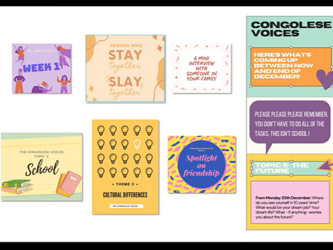Key takeaways from the Kids and Youth Summit
Rise of social media
Ofcom’s Children’s Media Lives study tracked the media and technology behaviours of children aged eight-18 for six years, and examined how pandemic restrictions had affected behaviour. The study, which used photos and video diaries submitted by children, showed a number of changes in technology use and lifestyle during the first lockdown between March and July last year, with children referring to the period as a “never-ending summer”, according to Jessica Rees, senior market research manager at Ofcom. Some children were doing an hour or less of schoolwork a day, with phone use dramatically rising, an increase in online gaming and many sleeping-in for hours on a morning.
One of the biggest trends, however, was the rise of the social media video platform TikTok. Most children cited its popularity, according to Rees, with many referencing trends on the platform such as viral dances, fitness and weight loss content, and well-known influencers.
“What was striking was that we were not talking about ‘where have the last 20 minutes gone?’ on TikTok,” said Rees. “Some children in the sample were reporting three, five or seven hours a day on TikTok, so we are talking about a media behaviour that is rivalling, and in some cases overtaking, the amount of time they are spending with other media such as YouTube.”
Challenges of lockdown
Coca-Cola and InSites Consulting explored how Covid-19 was affecting the everyday lives of Generation Z, based on insights from teenagers across eight markets, combined with a study of more than 40 different global sources of secondary research.
One idea that was popular among Generation Z, according to Joeri Van den Bergh, co-founder and future consumer expert at InSites Consulting, was the “fear of having no moments” and missing one-off life experiences due to the pandemic, such as graduations, sixteenth or eighteenth birthdays or even exams. The research indicated that many of the methods of communicating during lockdown, such as Zoom, the Houseparty app and gaming streaming platforms, would remain popular even once the pandemic eased, but a number of the children in the research highlighted the need for a “digital detox” and refocus on real-life interactions to make up for lost time.
“They learned to value in-person interactions more than before,” said Van den Bergh. “The lockdowns taught them the importance of living ‘in the moment’ and they understood that things can change overnight. Previously they thought they were writing their own life narratives, but for the first time in their lives they thought they were not in control at all.”
Mental health
Clearview Research found that mental health had also been adversely affected by Covid-19 restrictions. The company ran a co-created study with young people to understand how the pandemic affected 16 to 25 year-olds’ career paths and prospects, which found that 35% had mental health issues.
Some groups, such as disabled people, were as much as three times more likely to have mental health ramifications from the pandemic than average, and women and people who had experienced racial discrimination were 1.5 times more likely to experience mental health issues, according to the research.
“This is 35% who reported mental health issues – this does not include people who did not realise or who did not feel comfortable or even have the means to diagnose themselves,” said Leon Mascott, youth co-creator on the Clearview Research project. “We have specific groups who were impacted even more, and this might reflect deeper issues. Mental health needs to be a priority.”
Acceptance of diversity
Diversity and inclusion is increasingly important for young people, according to Discovery Research’s annual qualitative kids and youth tracker, particularly following increased media coverage of the issue following the Black Lives Matter movement protests over the summer of 2020.
The research found that young people who had some experience of diversity found it easier to talk about and were better able to formulate their ideas on the issue than those who had little to no experience of diversity. It also found that attitudes to diversity among brands and companies strongly influenced how Generation Z interacted with them.
Afra Acquah, associate director at Discovery, said: “Young people are noticing shifts in the ways that brands are representing themselves, with an increase in more diverse people and with less inclusive brands trying hard to demonstrate how they are embracing differences. The brands that are embracing diversity well are far more ‘top of mind’ than those that are not.”
Greater demands on brands
Research from Kadence International and Tesco Mobile found that Generation Z had a very different relationship with brands than some of their forebears. Generation Z particularly wanted creativity, passion and confidence from companies, however, they also specifically wanted greater flexibility in contracts and were less likely to be early adopters of new trends compared with the millennial generation. This owed to the lack of disposable income among young people, and fears over future job security that have been heightened by Covid-19. There was a greater onus on how brands could affect mood, with 42% stating that brands should make them look or feel better.
“Generation Z’s expectations are much stronger and they have different needs that they want a brand to show they are committed to,” said Hayley Bunn, customer research and innovation manager at Tesco Mobile. “We need to make sure Generation Z hear what they need to so they know their needs and expectations are going to be met, as their needs and expectations are very different to those of their parents.”

We hope you enjoyed this article.
Research Live is published by MRS.
The Market Research Society (MRS) exists to promote and protect the research sector, showcasing how research delivers impact for businesses and government.
Members of MRS enjoy many benefits including tailoured policy guidance, discounts on training and conferences, and access to member-only content.
For example, there's an archive of winning case studies from over a decade of MRS Awards.
Find out more about the benefits of joining MRS here.














0 Comments